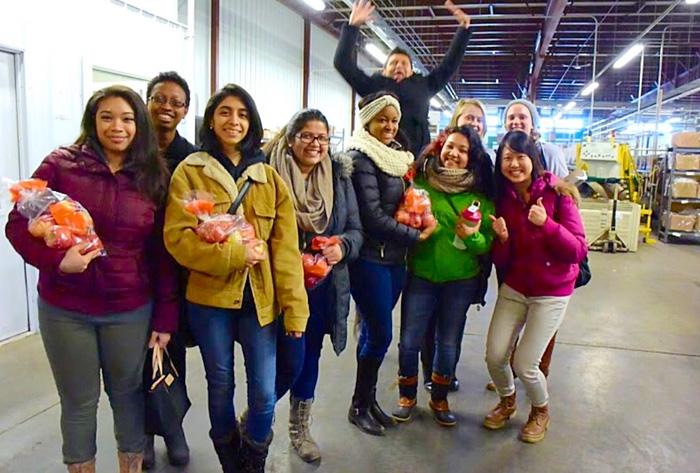Alicia Canas learned about the many ways that one person can work together with others to contribute to the same cause.
By Alicia Canas ‘16
Sometimes, when I mention what I am studying in college, or the work I do for a non-profit, I am asked about why I am “trying to change the world” if it’s not my responsibility. I am asked about how can I expect to make any change because I am “just one person” and I am told that there will always be poverty, prejudice, and other forms of oppression. I have always tried to explain that even the smallest action can have a positive impact on someone else’s life. The experiences I have had during Rural and Migrant Ministry’s (RMM) Alternative Spring Break have solidified this belief.
Every speaker that visited us was working to fight the injustices facing farmworkers in NYS, and every farmworker we spoke with told us about how they had been positively affected by these types of actions. A couple of years ago, farmers were finally required to provide clean drinking water and sanitation facilities to farmworkers. This may be only a small victory, but farmworkers still directly feel its impacts. When we visited a local high school to talk with students about college life and the realities of being a child of a farmworker, these students were aware of the importance of their actions and “a better life” was frequently cited as one of their motivations to go to college.
One of the speakers who visited us, Librada Paz, told us how no one gave her help or support while she was earning her degree in mechanical engineering from Rochester Institute of Technology, raising a child and working two jobs at the same time. She won the Robert F. Kennedy Human Rights Award in 2012. Just imagine what the students we met could now accomplish with the support and resources provided by RMM and other organizations. These students should not have to struggle in order to create a better future for themselves and their families in the same way that their previous generations of farmworkers and farmworker children have.
Farmworkers are the driving force behind the economy and the source of our food. They deserve to have minimum wage, collective bargaining, a day of rest, and all the other rights that they are excluded from. At RMM’s Alternative Spring Break, I learned about the many ways that one person can work together with others to contribute to the same cause, and I saw that creating a more just reality is always possible.

Picture taken with Jazmine Javier ‘16 and Alicia Canas ’16 at an apple processing center. Photo Credit: Alicia Canas
For further information, please contact:
Todd Wilson
Strategic Communications Director
p – 516.237.8634
e – twilson@adelphi.edu